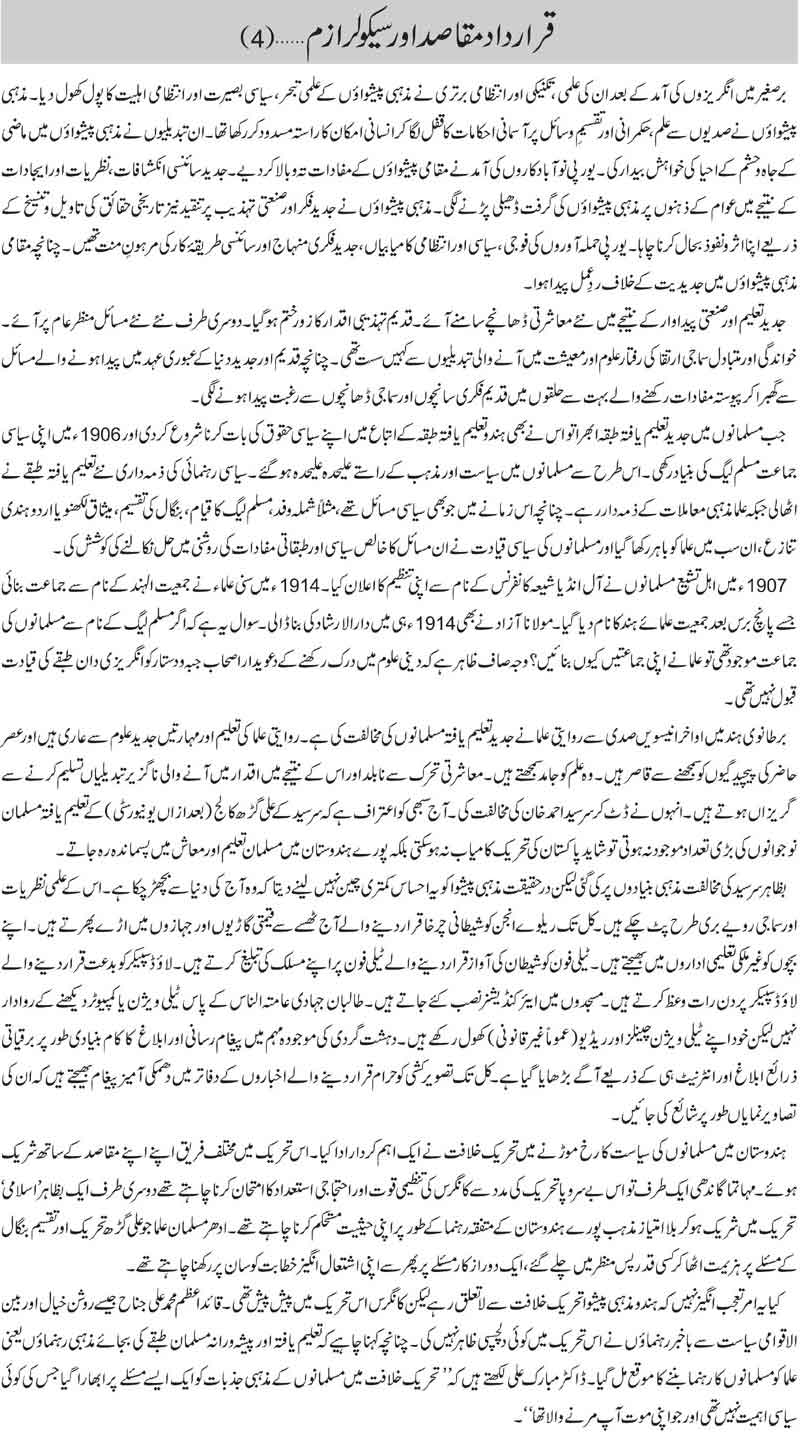| Urdu Section | |
| 31 Mar 2010, NewAgeIslam.Com | |
| OBJECTIVES RESOLUTION AND SECULARISM—PART 4 | |
By Wajahat Masood After the arrival of the British in the sub-continent, their educational, technical and administrative supremacy outplayed the intellectual depth, political vision and administrative capabilities of the Muslim religious leaders. For centuries, the religious scholars had closed the paths of human possibilities by putting a lock of heavenly revelations on knowledge, governance and distribution of resources. The changes rekindled the desire of renaissance of their pomp and retinue in the past among the religious leaders. The arrival of the European colonialists destroyed the interests of the local peshwas. As a result of the scientific discoveries and inventions, the hold of the religious leaders on the the people's mind loosened. The religous peshwas tried to reclaim their hold and influence by criticising the industrial civilisation with the interpretations and representations of historical facts. The military, political and administrative success of the European invaders was indebted to the modern way of thinking and scientific approach. Therefore, the religious leaders reacted against the modernity. Modern education and industrial productivity gave birth to new social structures. The power of old civilisational values diminished. On the other hand new problems raised their heads. The speed of literacy and alternative social evolution was slower than that of sciences and economy. consequently, threatened by the problems breeding in the transitional period of the old and the new order, sections harbouring hidden interests started showing a love for the old thought models and social structures. When the Muslim educated section emerged, they too started asserting their political rights following in the footsteps of the Hindus and founded their own political party, the Muslim League. In this way, politics and religion parted ways in the Muslim polity. The new educated section assumed the responsibility of the political leadership while the religious leaders remained responsible for religious affairs. Therefore, the ulemas were sidelined on all the issues of that period such as Shimla Delegation, the establishment of the Muslim League, the Partition of Bengal, the Covenant of Lucknow or the Urdu-Hndi dispute and the political leadership of the Muslims tried to find a solution in the light of political and class-based interests. In 1907, the Shia Muslims announced their own organisation called All India Shia Conference. In 1914, the Sunni Muslims formed their own organisation called Jamiatul Hind which was rechristened Jamiat-e-Ulema-e-Hind five years later. Maulana Azad too founded Darul Irshad in 1914. The question is why the ulema formed their own bodies when the Muslim League was already in place. The answer is obvious. The noblemen in gaberdine and turban claiming the knowledge of the religious sciences could not accept the leadership of the English-speaking people. Since the outset of the 19th century, the traditional ulema have opposed the educated Muslims. The skills and educational orientation of the traditional ulema are devoid of the modern sciences and unable to cope with the complexities of the contemporary world. They consider knowledge exanimate. They are oblivious to the social mobility and averse to accepting the invetible changes in the values as a consequence. They opposed Sir Syed tooth and nail. Today every one admits that if Sir Syed's Aligarh College (later university) had not produced a large number of educated Muslim youths, perhaps the movement for Pakistan would not have succeeded and probably the Muslims in the entire India would have remained backward educationally and economically. Apparently, Sir Syed was opposed on religious basis, but actually the realisation makes them restless that they have been left behind in today's world. Their scholastic views and social approach have been beaten to the ground. Those who likened the railway engine to satanic wheels not very long ago travel in priceless cars and fly in airplanes without any regrets. They send their children to international schools. Those who regarded the telephone as the satan's voice, today propagate their faith or sect on the telephone. The loudspeaker to them was unislamic but today they deliver sermons on the loudspeaker day in and day out. Mosques are fitted with airconditioners. Taliban are not in favour of allowing the common men to watch television or listen to the radio but they are running their own TV channels (mostly illegal). In the ongoing war of terrorism, the electronic media and the internet has been used by them to the optimum level. Those who till the other day pronounced photography haram, send threatening messages to newspapers in order to get their photographs published prominently. The Khilafat movement played an important role in redirecting the Muslim politics. Different lobbies joined the movement with their own agenda. On the one hand, Gandhiji wanted to test the organisational strength and protesting capabilities of the Congress, and on the other, wanted to strengthen his position as a mass leader of the entire India irrespective of religion by joining this absurd movement. The Muslim religious scholars who had been relegated to the corner during the Aligarh Movement or the issue of partition of Bengal, wanted to hone their inflammatory oratorical skills on this rusted issue. Isn't it surprising that the Hindu religious leaders remained aloof from the Khilafat movement but the Congress took the lead in it. Broadminded leaders like Qaid-e-Azam who were aware of the international political affairs did not show any interest in this movement. Therefore, instead of educated and professional Muslim section, the religious scholars or the ulemas got the opportunity to become the leaders of the Muslims. Dr Mubarak Ali writes, "Through the Khilafat movement, the religious emotions of the Muslims were fomented on such an issue which had no political significance and was going to die its own death." URL.: http://newageislam.com/NewAgeIslamUrduSection_1.aspx?ArticleID=2637
| |
--
Asadullah Syed

No comments:
Post a Comment